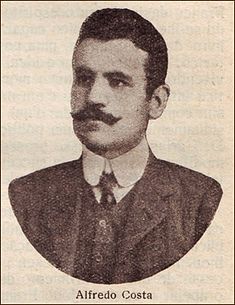Alfredo Costa
| Alfredo Costa | |
|---|---|
 |
|
| Born |
Alfredo Luís da Costa 24 November 1883 Casével, Castro Verde |
| Died | 1 February 1908 (aged 24) Lisbon |
| Cause of death | Shot by police |
| Occupation | |
| Parent(s) |
|
| Killings | |
| Date | 1 February 1908 |
| Location(s) | Terreiro do Paço |
| Target(s) |
|
| Killed | 2 |
| Injured | 1 |
| Weapons | Browning revolver |
Alfredo Luís da Costa (24 November 1883 – 1 February 1908), was a Portuguese publicist, editor, journalist, store clerk and salesman who was part of the Portuguese Carbonária and a Mason, best remembered for being one of the two assassins (with Manuel Buíça) credited in the assassination of King Carlos I of Portugal and the Prince Royal, Luis Filipe, during the events that became known as the 1908 Lisbon Regicide (on February 1, 1908), ultimately leading to his death.
He was born to Manuel Luís da Costa and Maria João da Costa in the small village of Casével, Castro Verde.
From a small farm in the Alentejo, he travelled to Lisbon where he worked for his uncle, a member of the Associação dos Empregados do Comércio de Lisboa (English: Association of Commerce Workers of Lisbon), and learned the alphabet in his shop.
On meeting Alfredo Luís, he was described as "...of a serious physiognomy, almost tragic" and with "big brown eyes, slow-moving, with a stance that appeared sleep-walking...with a moustache on his face, the nose lightly bent to the left. It is probable that he had untreated tubercolosis...and a perceptible bend in his back..." Later, Costa would continue as a sales clerk, after leaving the employ of his uncle, and traveling the country. Self-trained and a natural rebel, in Angra do Heroísmo he worked for a labour newspaper for workers in commerce, where as an able journalist he continued to submit weekly dispatches. While in Angra, he was also the driving force behind the Núcleo da Juventude Anarco-Sindicalista (English: Center for Anarchist-Syndicalist Youth) He continued his career in 1903, in Estremoz, where he was a republican propagandist, contributing to local newspapers with an unlimited dedication. With a small loan from a colleague he founded a small bookstore, A Social Editora, with Aquilino Ribeiro, where he edited several pamphlets against the regime, and distributed them door-to-door. This included his A Filha do Jardineiro (English: The Gardener's Daughter) an ironic romance that disparaged the royal family over seven decades, and which consumed most of his savings.
...
Wikipedia
